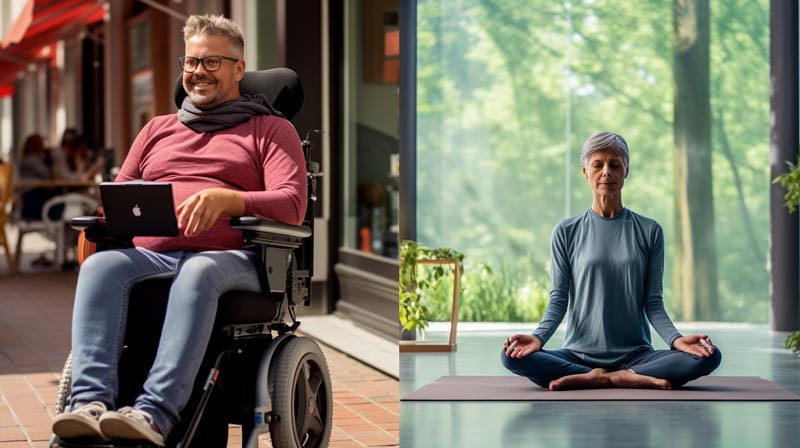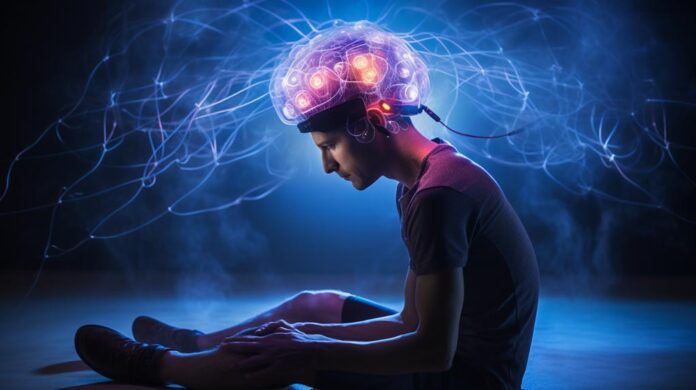The long-term effects of stroke can exert a life-altering toll on individuals. This affects everything from mobility to mental health, thus requiring a multi-faceted approach to manage these persistent challenges.
Stroke is the second leading cause of death worldwide, accounting for 6.7 million fatalities. It is also a leading cause of long-term disability worldwide. The road to recovery is often complex for survivors due to physical and cognitive consequences that persist long after the initial stroke. Understanding and managing these long-term effects is critical.
Immediately after a stroke, the focus is on stabilising and preventing complications. But the long-term physical, psychological, and lifestyle impacts present ongoing challenges. Weakness, fatigue, mobility limitations, falls, and depression are common physical and emotional issues years after a stroke. Lifestyle modifications, new coping strategies, and advanced rehabilitation are frequently needed for optimal recovery.
Exploring the long-term effects of stroke in critical areas can help patients, caregivers, and healthcare providers address challenges and enhance quality of life. In this article, we will:
- Examine leading risk factors contributing to long-term deficits.
- Assess daily life impacts of common physical and cognitive disabilities.
- Discuss positive lifestyle changes that aid stroke recovery.
- Review advanced management strategies to maximise function.
Arming patients with what to expect and effective solutions lays the groundwork for the best possible outcome. While recovery is lifelong, the right tools make it a hopeful journey.
Unveiling Key Factors of Long-Term Effects of Stroke
The long-term effects of stroke, its severity and duration depend heavily on modifiable risk factors. Conditions like hypertension, smoking, and physical inactivity heighten susceptibility and worsen outcomes. Understanding how these factors intersect with stroke is critical for prevention and supporting recovery.
- Hypertension: High blood pressure damages blood vessels, increasing clotting risk and vulnerability to rupture. It is present in over 75% of stroke patients and associated with larger strokes and worsened disability. Managing hypertension is essential for lowering recurrent stroke risk.
- Smoking: Smoking doubles stroke risk by harming blood vessels and increasing clotting. Smoking at the time of stroke is linked with increased severity and mortality. Quitting smoking after a stroke is vital for recovery.
- Physical Inactivity: Lack of exercise is an independent risk factor for stroke by heightening obesity, diabetes, and hypertension risk. Being inactive impairs recovery by exacerbating weaknesses and deconditioning. Regular activity after a stroke is vital.
Advanced age, obesity, and diabetes also heighten susceptibility. While risk factors are not modifiable, their careful management can alleviate the long-term effects of stroke through secondary stroke prevention and supporting physical capabilities.

Daily Life Consequences of Long-Term Effects of Stroke
Stroke can leave lasting impairments that hamper daily function and independence. Thus dramatically influencing the long-term effects of stroke. Understanding common deficits allows proactive steps to manage their lifestyle impacts.
1. Physical Disabilities
- Weakness – Many survivors experience hemiparesis, or weakness on one side of the body, due to stroke damaging motor control centres. This impairs mobility and activities.
- Fatigue – Mental and physical fatigue are reported by up to 70% of survivors. The causes are unclear but may involve neural damage and deconditioning. Fatigue reduces activity tolerance.
- Mobility Issues – Impaired coordination, balance, and gait increase assistive device needs and fall risks, limiting independence. Fall-related injuries can exacerbate problems.
- Spasticity – Shortened muscles cause stiff, hypertonic limbs that hinder movement and dexterity. Spasticity worsens over time if not addressed.
- Pain – Common after stroke, exacerbated by limited mobility, fatigue, and depression. This further deters physical activity.
2. Cognitive Impairments
Memory loss, reduced information processing speed, attention deficits, and confusion are reported in up to 75% of stroke survivors. These impair work, social, and daily living activities.
3. Emotional Changes
Anxiety, depression, and frustration are frequently experienced and influenced by injury severity, fatigue, and cognitive issues. Emotional struggles can hamper motivation and recovery.
Adaptations like assistive devices, supervised exercise, cognitive therapy, and added social support help offset disabilities and enhance quality of life. With proper long-term management, positive outcomes are possible.
Lifestyle Changes for Stroke Recovery
Adopting healthy lifestyle habits is critical for managing the long-term effects of stroke and preventing recurrent stroke. Adjusting behaviours in a few key areas can have a significant impact.
- Regular Exercise: Physical activity improves mobility, reduces fatigue, and lowers recurrent stroke risk. Aerobic activity and strength training are particularly beneficial when tailored to ability level.
- Nutritious Diet: Eating fruits, vegetables, whole grains, lean proteins, and healthy fats aids heart health. Limiting sodium, sugars, and saturated fats also supports stroke recovery.
- Refraining from Smoking: Quitting smoking reduces stroke recurrence likelihood and enhances health. Counselling and nicotine replacement can help overcome this addiction.
- Stress Management: Relaxation practices like meditation, tai chi, and yoga alleviate anxiety and blood pressure. This supports emotional health.
- Adequate Sleep: Sleeping 7-8 hours daily is vital for physical and mental recovery. Improving sleep hygiene helps manage fatigue.
- Social Engagement: Interacting with support groups, loved ones, and rehabilitation communities fights depression and motivates recovery.
Adjusting daily habits and routines promotes well-being and helps overcome long-term limitations to enjoy life after a stroke.

Advanced Management Strategies After Stroke
Specialised rehabilitation programs help stroke survivors continue improving physical and cognitive function years after their initial injury. These strategies maximise independence.
- Task-Oriented Training: Focuses on the repetitive practice of activities needed for daily living, like walking, dressing, and cooking, to rebuild motor skills through neuroplasticity.
- Assistive Technology: Devices like braces, grippers, mobility aids, and adaptive utensils accommodate disabilities and enhance independence with daily tasks.
- Brain Stimulation: Techniques like transcranial magnetic or direct current stimulation show promise for enhancing motor recovery when applied to affected areas.
- Robotic Therapy: Uses automated machines and virtual reality systems to guide repetitive movements that aid motor relearning and strength.
- Cognitive Training: Computerised programs and paper/pencil exercises aim to sharpen attention, memory, planning, and information processing impaired after stroke.
- Constraint Therapy: Physically restrains less-impaired limb to force use of the more affected side and stimulate neuromuscular recovery.
Advanced techniques extend the benefits of early rehabilitation to continually boost physical and mental capabilities years after stroke.

Uncommon Yet Relevant Facts about Stroke
Looking beyond the well-known aspects of stroke provides additional considerations for the long-term effects of stroke and outlooks.
- Stroke risk doubles each decade after age 55. Recurrence prevention and rehabilitation planning are vital for ageing populations.
- Weakness/paralysis often affects only one side since each hemisphere controls the opposite side. Rehab targets the impaired side.
- Mini-strokes called TIAs (Transient Ischemic Attack) resolve within 24 hours but increase future stroke risk. TIA patients require prompt evaluation.
- Exercise may help prevent recurrent stroke by improving arterial function and cardiovascular health. Activity is also crucial for maximising physical recovery.
- Motivators and barriers to ongoing rehabilitation are complex. More research is needed on facilitating long-term participation.
Recognising these less common elements offers a fuller context that may influence care approaches and priorities after a stroke.
Closing Remarks on Long-Term Impact of Stroke on Recovery and the Role of Exercise
Coping with the long-term effects of stroke can be daunting. Yet, it becomes more manageable with proper knowledge and preparation. Being aware of risk factors and common disabilities is crucial. Likewise, knowing about lifestyle adjustments and advanced therapies helps. These factors enable you to take proactive steps for the best outcome.
Stroke recovery is full of persistent challenges. Yet, every small victory is meaningful. Patients and caregivers can arm themselves with strategies. These strategies help to understand and overcome long-term limitations. They provide hope for a better life after a stroke.
Understanding the long-term effects of stroke is vital. Exercise is a powerful ally for effective recovery. It reduces the risk of recurrent episodes by nearly 30%. It also improves cognitive performance. Exercise isn’t just for physical well-being. It’s a complete rehabilitation tool for both body and mind.
Timing in exercise is critical. Light mobility work is good in the acute phase. More structured activities come in the later phases. Safety is vital, requiring medical supervision and careful planning. With wise incorporation of exercise, the long-term effects of stroke are not insurmountable.
For a more in-depth look at stroke and the role of physical activity in recovery, check out the detailed writeup on ‘Stroke and Physical Recovery.’
Sources
- Ali M, Bath PM, Curram J, Davis SM, Diener HC, Donnan GA, Fisher M, Gregson BA, Grotta J, Hacke W, Hennerici MG, Hommel M, Kaste M, Marler JR, Sacco RL, Teal P, Wahlgren NG, Warach S, Weir CJ, Lees KR. The Virtual International Stroke Trials Archive. Stroke. 2007 Jun;38(6):1905-10.
- Barker-Collo, S. (2007). Depression and anxiety 3 months post stroke: prevalence and correlates. Archives of clinical neuropsychology, 22(4), 519-531.
- Benjamin, E. J., Blaha, M. J., Chiuve, S. E., Cushman, M., Das, S. R., Deo, R., … & Isasi, C. R. (2017). Heart disease and stroke statistics-2017 update: a report from the American Heart Association. Circulation, 135(10), e146-e603.
- Benjamin, E. J., Muntner, P., Alonso, A., Bittencourt, M. S., Callaway, C. W., Carson, A. P., … & Das, S. R. (2019). Heart disease and stroke statistics-2019 update: a report from the American Heart Association. Circulation, 139(10), e56-e528.
- Billinger SA, Arena R, Bernhardt J, Eng JJ, Franklin BA, Johnson CM, MacKay-Lyons M, Macko RF, Mead GE, Roth EJ, Shaughnessy M, Tang A; American Heart Association Stroke Council; Council on Cardiovascular and Stroke Nursing; Council on Lifestyle and Cardiometabolic Health; Council on Epidemiology and Prevention; Council on Clinical Cardiology. Physical activity and exercise recommendations for stroke survivors: a statement for healthcare professionals from the American Heart Association/American Stroke Association. Stroke. 2014 Aug;45(8):2532-53.
- Carin-Levy, G., Kendall, M., Young, A., & Mead, G. (2009). The psychosocial effects of exercise and relaxation classes for persons surviving a stroke. Canadian Journal of Occupational Therapy, 76(2), 73-80.
- Elsner, B., Kugler, J., Pohl, M., & Mehrholz, J. (2016). Transcranial direct current stimulation (tDCS) for improving capacity in activities and arm function after stroke: a network meta-analysis of randomised controlled trials. Journal of NeuroEngineering and Rehabilitation, 13(1), 1-8.
- Hackett, M. L., & Pickles, K. (2014). Part I: frequency of depression after stroke: an updated systematic review and meta-analysis of observational studies. International journal of stroke, 9(8), 1017-1025.
- Ivey, F. M., Ryan, A. S., Hafer-Macko, C. E., & Macko, R. F. (2007). Improved cerebral vasomotor reactivity after exercise training in hemiparetic stroke survivors. Stroke, 38(6), 1994-2000.
- Lee, C. D., Folsom, A. R., & Blair, S. N. (2003). Physical activity and stroke risk: a meta-analysis. Stroke, 34(10), 2475-2481.
- McKevitt, C., Fudge, N., Redfern, J., Sheldenkar, A., Crichton, S., Rudd, A. R., … & Ramsay, C. (2011). Self-reported long-term needs after stroke. Stroke, 42(5), 1398-1403.
- Mehrholz, J., Pohl, M., Platz, T., Kugler, J., & Elsner, B. (2018). Electromechanical and robot‐assisted arm training for improving activities of daily living, arm function, and arm muscle strength after stroke. Cochrane Database of Systematic Reviews, (9).
- National Stroke Association. (2014). Transient Ischemic Attack (TIA).
- National Stroke Association. (2019). Hemiparesis.
- Nicholson S, Sniehotta FF, van Wijck F, Greig CA, Johnston M, McMurdo ME, Dennis M, Mead GE. A systematic review of perceived barriers and motivators to physical activity after stroke. Int J Stroke. 2013 Jul;8(5):357-64.
- O’Donnell, M. J., Chin, S. L., Rangarajan, S., Xavier, D., Liu, L., Zhang, H., … & Lopez-Jaramillo, P. (2016). Global and regional effects of potentially modifiable risk factors associated with acute stroke in 32 countries (INTERSTROKE): a case-control study. The Lancet, 388(10046), 761-775.
- Oza, R., Rundell, K., & Garcellano, M. (2017). Recurrent ischemic stroke: strategies for prevention. The American journal of managed care, 23(6 Suppl), S107-S113.
- Ponchel A, Bombois S, Bordet R, Hénon H. Factors Associated with Poststroke Fatigue: A Systematic Review. Stroke Res Treat. 2015;2015:347920. Epub 2015 May 25. PMID: 26101691; PMCID: PMC4458555.
- Rodriguez-Luna D, Piñeiro S, Rubiera M, Ribo M, Coscojuela P, Pagola J, Flores A, Muchada M, Ibarra B, Meler P, Sanjuan E, Hernandez-Guillamon M, Alvarez-Sabin J, Montaner J, Molina CA. Impact of blood pressure changes and course on hematoma growth in acute intracerebral hemorrhage. Eur J Neurol. 2013 Sep;20(9):1277-83.
- Roger, V. L., Go, A. S., Lloyd-Jones, D. M., Benjamin, E. J., Berry, J. D., Borden, W. B., … & Fullerton, H. J. (2012). Heart disease and stroke statistics—2012 update: a report from the American Heart Association. Circulation, 125(1), e2-e220.
- Timmermans, A. A., Lemmens, R. J., Monfrance, M., Geers, R. P., Bakx, W., Smeets, R. J., & Seelen, H. A. (2014). Effects of task-oriented robot training on arm function, activity, and quality of life in chronic stroke patients: a randomized controlled trial. Journal of neuroengineering and rehabilitation, 11(1), 1-9.
- Walker, M. F., Hoffmann, T. C., Brady, M. C., Dean, C. M., Eng, J. J., Farrin, A. J., … & Watkins, C. L. (2017). Improving the development, monitoring and reporting of stroke rehabilitation research: consensus-based core recommendations from the Stroke Recovery and Rehabilitation Roundtable. International Journal of Stroke, 12(5), 472-479.
- Watkins CL, Leathley MJ, Gregson JM, Moore AP, Smith TL, Sharma AK. Prevalence of spasticity post stroke. Clin Rehabil. 2002;16:515-522.
- Verheyden, G., Vereeck, L., Truijen, S., Troch, M., Lafosse, C., Saeys, W., Leenaerts, E., & De Weerdt, W. (2006). Additional exercises improve trunk performance after stroke: a pilot randomized controlled trial. Neurorehabilitation and neural repair, 20(3), 284-293.
- Wolf, S. L., Winstein, C. J., Miller, J. P., Taub, E., Uswatte, G., Morris, D., … & Nichols-Larsen, D. (2006). Effect of constraint-induced movement therapy on upper extremity function 3 to 9 months after stroke: the EXCITE randomized clinical trial. Jama, 296(17), 2095-2104.



